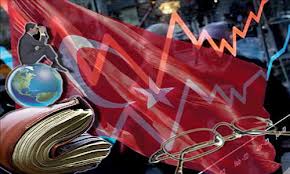By Yahya Madra, Ahval
Turkey’s is a hostage economy. In its most restricted form, the hostage economy can be seen through the plight of intellectuals, academics, journalists, democrats and many foreigners either imprisoned, purged or unable to travel abroad.
The arbitrariness of the verdicts against them and the ease with which charges are dropped show they are hostages. President Recep Tayyip Erdogan’s own pronouncements confirm this view. During the now-resolved Andrew Brunson dispute with the United States, Erdoğan explicitly suggested trading the U.S. evangelical pastor for Pennsylvania-based Turkish preacher Fethullah Gülen, the man Turkey accuses of being behind a 2016 failed coup.
A state of emergency declared after the coup to root out members of the Gülen network provided the legal framework for these imprisonments or extended pre-trial detentions and has become normalised into a repressive apparatus that ensures an arguably more fundamental red line is not crossed.
Anyone breaking the fundamental taboo of the Turkish state – questioning the official policy against the Kurdish movement – is deemed an enemy of the state. It is not a coincidence that those who dare to take a critical position on this taboo issue tend to be progressives of various sorts who have connections with liberal political parties, the premier academic institutions and the NGOs focused on social justice and human rights. Hence, they have become hostages in the eyes of the progressive public in the West.
The Kurdish-led experiment of democratic federalism in northeast Syria is also, in part, a hostage to Turkey’s anxiety over the irreversible Kurdish political awakening across Mesopotamia. Turkey’s occupation of the Syrian districts Al-Bab and Afrin, and its control of Idlib were all enacted with the explicit objective of limiting and undermining the advance of the Kurdish-led Syrian Democratic Forces (SDF). This anxiety makes Turkey, a longstanding member of NATO and nominally an EU candidate, a particularly problematic liability from the perspective of the Western governments such as the United States and France, which have invested in the SDF first to defeat Islamic State, and now as a counter-balance to Iranian influence in the region.
Europe’s position in relation to Turkey is also very complicated. Turkey’s current debt crisis has made the financial entanglement of European and Turkish banking sectors more apparent. Europe and Turkey are important trading partners. Almost 40 percent of Turkey’s exports are to Europe, but more importantly, intermediary goods provide a significant portion of trade between Turkey and Europe. Turkey’s dynamic productive sector has been extensively integrated into the European economy through supply chains.
In short, the European economy is very much entangled with that of Turkey’s, and a process of delinking would be costly for both sides. But an equally, if not more important factor is Fortress Europe’s fear of refugees-at-the-gates, making it a hostage to Turkey as the state that holds Europe’s border against the social, political and ecological disaster that is the Middle East.
A similar state of becoming hostage by complicity characterises the Turkish bourgeoisie. Even though Erdoğan presents himself as a critic of the so-called interest-rate lobby (a code word for the Istanbul bourgeoisie that controls much of the financial sector) and global financial institutions, Erdoğan and his party have always been explicitly and aggressively pro-business and anti-working class. His party’s electoral control over the large sectors of the devout working class has been through channels of social policy that meet the workers in the household rather than the workplace.
In the workplace, the ruling Justice and Development Party (AKP) has always been aggressively anti-union and has always raised the rate of exploitation. The many deaths and horrifying working conditions during the construction of Istanbul’s new third airport are only the most visible instances of the highly leveraged extractionist government’s routine class violence. The Turkish bourgeoisie, and in particular the Istanbul bourgeoisie, while possibly genuinely uncomfortable with Erdoğan’s style, has benefitted from and been complicit with the pro-business stance of the Erdoğan government.
The current debt crisis has rendered this deep complicity even more explicit. The Erdoğan government, while appearing to be blundering its way through the process of crisis management, holds the power to decide who is going to be rescued and who is going to be left to drown through the recession that will last through a good part of 2019, if not longer. While the crisis will no doubt have unanticipated consequences (especially with local elections in March), there is no doubt that the government will be looking for opportunities to refashion the capitalist classes to its liking.
The Erdoğan government can survive the crisis, if only because the nationalist opposition in Turkey (be it the left-ish Republican People’s Party or the right-wing Good Party) is also, in a certain sense, a hostage to Erdoğan’s narrative of imperialist threat against national unity and the territorial integrity of the Turkish state. Here there is a deeper sense of complicity with the official discourse of the state and its deep-seated anxieties over the Kurdish political will.
But perhaps the real hostage at the very centre of this network is Erdoğan himself. Without doubt, politics is an art of give and take, of being indebted and making people indebted to oneself. Erdoğan has always been very shrewd about this commercial aspect of politics, but the rise of political Islam in Turkey cannot be reduced to his manoeuvrings. Today, Erdoğan’s politics is reduced to a nexus of exchanges that can hold itself together only through a hostage economy. In other words, he has become a hostage of the very hostage economy that he has weaved around himself.









